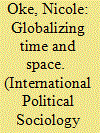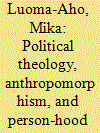|
|
|
Sort Order |
|
|
|
Items / Page
|
|
|
|
|
|
|
| Srl | Item |
| 1 |
ID:
090727


|
|
|
|
|
| Publication |
2009.
|
| Summary/Abstract |
This paper draws on interviews conducted in the days and weeks after the events of September 11th, 2001, analyzing the transition from "September 11th, 2001" to "9-11." That is, from the discursive void that immediately followed the acts of terrorism in New York, Virginia and Pennsylvania to the apparently self-evident crisis that the events came to represent in the following days and weeks. First, the paper redresses persistent oversights of discourse-oriented work by recognizing and investigating both the agency of the US general public and the context that official responses were articulated in. Second, the paper serves to denaturalize the construction of 9-11 as crisis, questioning the first and pre-requisite stage of the emerging discourse of the "War on Terror." Theorizing void, crisis and their relationship enables an understanding of how the War on Terror was possible and opens a critical space for its contestation.
|
|
|
|
|
|
|
|
|
|
|
|
|
|
|
|
| 2 |
ID:
090729


|
|
|
|
|
| Publication |
2009.
|
| Summary/Abstract |
Globalization discourse is concerned with the effects of spatial change-changes in the shape, scale and extensity or social processes-and the effects of temporal change-particularly changes to, or away from, modernity. By drawing together both axes of change, globalization discourse suggests a way of navigating this tension. However, it is argued here that most globalization theories accord primacy to one of these axes, which results in them being conflated. As a result, globalization theories are often presented in highly systemic terms and downplay the diversity of social processes.
|
|
|
|
|
|
|
|
|
|
|
|
|
|
|
|
| 3 |
ID:
090728


|
|
|
|
|
| Publication |
2009.
|
| Summary/Abstract |
In this article I identify international relations as a form of religion. My identification takes two epistemological paths. The first one has been cleared by political theologians such as Carl Schmitt, who teach that "secular" political ideas not only have a divine origin, but also structural identity with Christian theology. I will clear the second path with help from a cognitive theory of religion that identifies anthropomorphism as a defining criterion of religion. International relations is a religion, because it is a system of thought that takes the metaphorical image of the personified, embodied state more seriously than other, more idiosyncratic forms of anthropomorphism. What we have in academic IR is, thus, a theology that works to generalize and systematize this religious image into a disciplinary form.
|
|
|
|
|
|
|
|
|
|
|
|
|
|
|
|
| 4 |
ID:
090726


|
|
|
|
|
| Publication |
2009.
|
| Summary/Abstract |
In Discipline and Punish Foucault famously declares that "our society is one not of spectacle, but of surveillance." Our theoretical aim in this paper is to problematize Foucault's strict demarcation between spectacle and surveillance through an analysis of urban mega-events. In the process, we detail emerging features of contemporary mega-events that shape and are shaped by shifts in the field of security and surveillance more broadly. Three dynamics in particular warrant consideration: the move toward a precautionary logic among security planners, a "semiotic shift" wherein security iconography is integrally bound up with the production of contemporary urban spectacles, and various forms of security and surveillance legacies that circulate beyond the spatial and temporal frame of the event itself. While mega-events support Foucault's assertion of the dispersal of discipline across the social field, they also suggest that this dispersal occurs in concert with, not in spite of, the power of the spectacle in contemporary society.
|
|
|
|
|
|
|
|
|
|
|
|
|
|
|
|
|
|
|
|
|